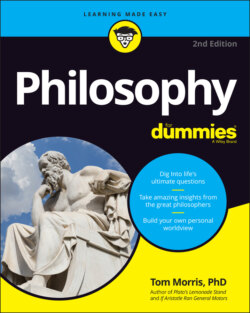Читать книгу Philosophy For Dummies - Tom Morris - Страница 27
Improving assessment
ОглавлениеPhilosophy also trains us to assess competing claims. Do people have free will, or are all our actions determined by heredity and environment? Does God exist, or not? Do humans survive physical death, or is everyone destined for personal extinction with the cessation of bodily functions? Does life truly have meaning, or is everything we do ultimately without any real sense and purpose? Is skateboarding great exercise, or maybe the fastest route to the emergency room? (Okay, so not all questions are cosmic in proportion.)
You are often confronted in everyday life by lots of competing claims and alternative proposals you need to assess: Should you find more funds to increase the quality of your product, or concentrate instead on more advertising? One group of experts says that children flourish with more freedom. Another group claims that they require more clear limits and discipline. One political candidate claims to have the best policies and character. A rival candidate calls that guy a dangerous traitor. How do you evaluate and assess such competing claims? Philosophy trains the mind in the fine art of assessment.
All that glitters is not gold. Appearances and realities can diverge. We live today in a world of hype, exaggeration, and hyperbole. Falsehood abounds. Plato’s Cave of Misleading Appearances is bigger and deeper than ever before (see Chapter 2). Illusions rule the world. Everyone has something to sell, and you’re bombarded every day by claims you must be able to evaluate. In a world of conflicting views vying for acceptance, you need to know how to separate the wheat from the chaff, the sheep from the goats, the real truth from groundless conspiracy theories, the collectibles from the trash. Caution is necessary. You need discernment. And discernment — the overall ability of good assessment — is a skill that philosophy can nurture. As the ancient poet Ovid noted, “The judgment of man is fallible.” We need all the help we can get.
In philosophy, you learn to assess a view by asking for evidence or other legitimate reasons to think it’s true. You enhance your ability to evaluate how one proposal for your acceptance may fit or fail to fit with other things you already have strong reason to believe or even know to be true. You are less likely to fall for wild conspiracy theories or clever lies meant to manipulate you and gain your allegiance.
In assessing a worldview or major philosophical position, just as in evaluating a business claim or overall political stance, you should always ask the following three basic sorts of questions, which can be called the 3 Cs of Assessment:
C1: Is it coherent? Do the various components of the view or position hang together logically? Does it make sense? Is it internally consistent? Is it inwardly congruent?
C2: Is it complete? Does it touch on and deal with all the relevant issues that it ought to take in, or does it have gaps and blind spots? Are any concerns swept under the rug? Is it comprehensive enough?
C3: Is it correct? For a position to merely be coherent and complete isn’t enough; the available evidence must point in its direction as the correct contender for truth. Coherence is necessary; completeness is important; but only correctness, in addition, gives you what you fully need. An internally consistent viewpoint that’s comprehensive in its sweep but at odds with the facts doesn’t do you much good in a practical way.
These, therefore, are the 3 Cs of assessment: coherence, completeness, and correctness. A philosophical position, similar to a business plan, may be correct as far as it goes, without going far enough. A viewpoint may be correct, within limits, without being complete enough. Consider a management theory that says companies prosper best when all their executives share a strong sense of purpose. That may be true, but it’s an incomplete perspective. As a matter of fact, a business can flourish best when everyone, not just the executives, shares a strong sense of purpose. And maybe customers and supplier need to be let in on that purpose as well. Such an assessment tells you that the original view needs more development. A philosophical view or theory may even be correct in its main principles but incoherent in some of its less vital components — in which case, it needs some logical retooling before we can accept it as a whole. We must check for and identify all three qualities of coherence, comprehensiveness, and correctness in order to evaluate it well. Keeping this concept in mind, you can greatly enhance your skills of assessment through a philosophical examination of any big claim or position.
